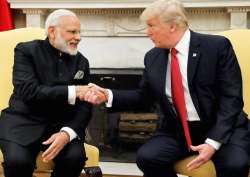'Indo-Pacific' over 'Asia-Pacific' reflects importance of India's rise: US official
During the Asia tour spread over 12 days, US President Donald Trump will be visiting Japan, South Korea, China, Vietnam and the Philippines.

The Trump administration on Sunday defended the use of "Indo-Pacific" phrase instead of "Asia Pacific", saying it captures the importance of the rise of India with which the US has strong and growing ties.
"We have strong and growing ties with India. We talk about 'Indo-Pacific' in part because that phrase captures the importance of India's rise," a senior White House official told reporters in Tokyo, as US President Donald Trump touched down in Japan, kicking off a marathon Asia tour.
During the tour spread over 12 days, Trump will also be visiting South Korea, China, Vietnam and the Philippines.
"It (Indo-Pacific) captures the importance of the maritime free commons that allow our security and our prosperity to continue," said the official, while responding to queries on the increasing use of the phrase "Indo-Pacific" by the Trump administration, its talk about free and open trade in the region and how the Chinese should regard that.
And the strategy is "certainly" not to contain China. "Containment, certainly not," the White House official said on condition of anonymity.
The official said America's security and prosperity depends on the US maintaining access for free flow of commerce to this region, because it is a Pacific nation.
"A free and open Indo-Pacific speaks to that vision, that we want to see the continued stability. We want to reaffirm our commitment to the continued stability of this region, allowing for freedom of navigation, allowing for the marketplace and free markets, really, to drive the prosperity of this region," the official said.
With Trump on his maiden visit to the region, the official said the US is looking at ways that it can signal and follow through on this centuries-old commitment.
"It's not just an accident of the World War II that the United States is in this region the way that have longstanding alliances, security treaties with five countries in the region and very close security and economic partnerships with others," the official asserted,
To a question on talks about a strategic dialogue between India, Japan, Australia and the US, the official said this is not about containing China.
"On the question of cooperation between allies and partners, the US is always talking very closely, from the leader level all the way down to our close allies, Australia and Japan. That is longstanding," the official said.
Neither the US nor Australia or Japan have a security alliance with India, the official said, adding: "India is an increasingly important security partner, no doubt. It's natural that they should be, given that they are really, sort of, conceptually the western edge of the Indo-Pacific region; the United States making up the eastern edge of that."
The official noted that the region encompasses half of the world's people, more than a third of the world's economy. Eventually, it's going to be pretty soon half of the world's economy. And this is a region that includes China, Japan, the Korean Peninsula, Northeast Asia. It includes Oceania, with US's partner, New Zealand and Pacific Islands, and its longstanding ally, Australia, in the south.
"India to the west; the United States the east," the official said.